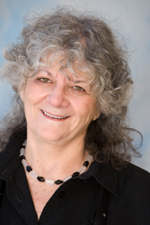From basic science to advanced clinical compounds
Ada Yonath
Ribosomes are the universal cellular machines that translate the genetic code into proteins. Composed of proteins and RNA, among which the RNA moieties perform almost all functional tasks, they posses spectacular architecture accompanied by inherent mobility that facilitate their smooth performance in decoding, peptide bond formation and nascent protein elongation.
Owing to their fundamental role, ribosomes are targeted by many antibiotics that paralyze the ribosomes by binding to their functional sites. Their binding modes, inhibitory action and synergism pathways will be demonstrated. Issues concerning their ability to differentiate between patients and pathogens, as well as mechanisms leading to bacterial resistance to antibiotics and ways to design advanced compound with the ability to combat antibiotics resistance will be discussed.
|
|

Ada Yonath |
Born in Jerusalem, Israel, Prof. Ada Yonath, studied at the Hebrew University, earned Ph.D. degree from Weizmann Institute of Science (WIS) and completed her postdoctoral studies at MIT, USA. She studies protein biosynthesis, focusing on ribosomes, which translates the genetic code into proteins, and on their inhibition by antibiotics, including mechanisms for acquiring resistance.
She is using X-ray crystallography supported by molecular biology, mutagenesis and other biophysical methods. For this aim, she established in the seventies the first laboratory for protein crystallography in Israel, which was the only laboratory of this kind in the country for almost a decade.
She is a professor of structural biology at WIS, holds the Kimmel Professorial Chair, and directing the Kimmelman Center for Biomolecular Structure and Assembly. In 1986-2004 she also headed the Max-Planck Research Unit in Hamburg, Germany.
She is a member of the US National Academy of Sciences (NAS); the American Academy of Arts and Sciences; the Israel Academy of Sciences and Humanities; the European Academy of Sciences and Art; the European Molecular Biology Organization; and the International Academy of Astronautics. Additionally, she has honorary doctorates from Tel Aviv, Ben Gurion, Bar Ilan and Oxford Universities.
Her awards include the 1st European Crystallography Prize; the Israel Prize; The Paul Karrer Gold Medal, Zurich, Switzerland; the Louisa Gross Horwitz Prize, NYC; the Paul Ehrlich-Ludwig Medal, Germany; the Wolf Prize; the UNESCO Award for Women in Science Prize,; the Albert Einstein World Award of Science; the Erice Prize for Peace and the Nobel Prize for Chemistry. |
|